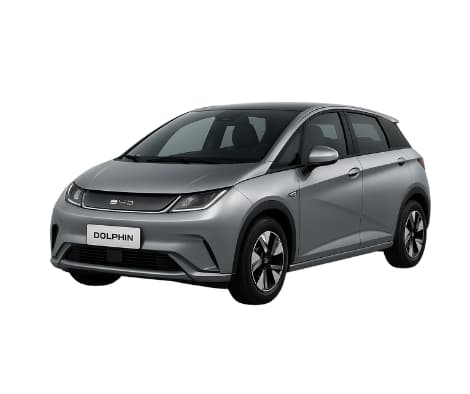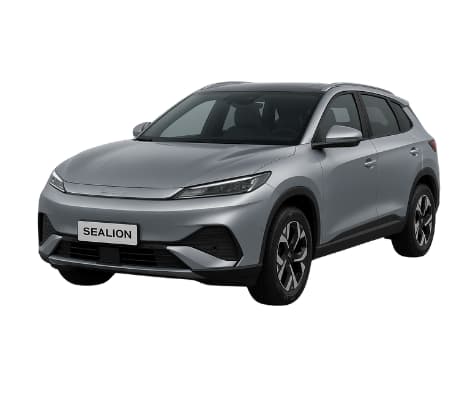Call Monday-Friday 9am - 6pm Closed Saturday & Sunday



[ Contact Us ]
Need Help? Calling from a mobile please call 0151 647 7556
0800 195 4926Do you have a question? or need help?
Call Monday-Friday 9am - 6pm Closed Saturday & Sunday,
The story of BYD is one you can’t ignore. While Tesla and Toyota get most of the headlines in the car industry, BYD, the Chinese company that means “Build Your Dreams” (In Chinese - ) has been quietly redefining what it means to be a car company in the 21st century. 
Recent reports say BYD has made more revenue than Tesla in 2024 ($107 billion vs $97.7 billion), sold almost the same number of EVs (just under 1.8 million each) and is launching an entry-level EV at half the price of the Telsa Model 3.
BYD is a serious challenger to Telsa CEO Elon Musk in the electric vehicle market.
But BYD also makes plug-in hybrids, and according to reports, it sold over 4 million cars globally in 2024 alone.
With its focus on electric mobility, vertical integration and innovation, BYD has got the world’s attention.
Here are ten cool facts about BYD that show why this company is a force to be reckoned with.
BYD started in 1995 when entrepreneur Wang Chuanfu founded the company in Pingshan in the Shenzhen region of China.
Initially, BYD made rechargeable batteries for mobile phones and other portable electronics. It wasn’t until 2003 that BYD entered the automotive sector by acquiring the Tsinchuan Automobile Company- and that was the start of an amazing journey that would eventually make BYD a global leader in electric vehicles.
BYD launched its first car, the BYD F3, in 2005. In 2008, it introduced a plug-in hybrid (PHEV), the BYD F3DM and a fully electric BYD e6.
BYD has been the number one in China’s new energy vehicle sales for over a decade. That includes fully electric vehicles (Battery Electric Vehicles - BEVs) and plug-in hybrids (PHEVs). China’s auto industry is very competitive, and BYD’s rise is even more impressive given that. Competition from other Chinese companies like MG, GWM (Great Wall Motors), Omoda, Nio and XPeng makes BYD’s achievements even more remarkable.
BYD reached a milestone in Q4 2023: it sold more electric cars than Tesla for the first time. 
BYD delivered 526,409 EVs in Q4 2023, just beating Tesla’s 484,507. While Tesla still led for the full year, that was a big deal for BYD as it showed it could compete globally- not just in China.
Given the global appeal of Tesla, that’s quite an achievement!
One of BYD’s greatest strengths is its vertical integration. Unlike many competitors, BYD manufactures most of its vehicle components in-house, including its batteries, electric motors, and semiconductors.
This improves efficiency and cost control and reduces dependence on external suppliers, which is a big advantage during global supply chain disruptions.
By controlling its production process, BYD can quickly adapt to changes and continue to meet demand without significant delays. This agility allows the company to navigate challenges that often hinder competitors that rely on external suppliers.
Moreover, BYD can innovate and implement new technologies faster by producing its own components, further solidifying its position as a leader in the electric vehicle industry.
This strategy makes BYD more resilient and enhances its reputation as a reliable and forward-thinking automaker in the ever-changing car industry landscape.
The company has more than 30 industrial parks worldwide and has expanded into key international markets such as Europe, Latin America, and Southeast Asia.
In 2020, BYD launched its passenger vehicle business in Norway with the Tang EV600 and has since rolled out its EVs to multiple European countries.
BYD launched the Blade Battery in 2020. Lithium iron phosphate technology has superior thermal stability and a longer lifecycle compared to traditional lithium-ion batteries.
That addresses some of the biggest concerns in EV adoption - battery safety and durability. The Blade Battery was first introduced in the BYD Han and has since become a standard in the brand’s lineup.
BYD’s ambitions go beyond passenger vehicles.
The company is a major producer of electric buses and commercial vehicles, and it has even developed monorail systems through its SkyRail and SkyShuttle projects.
Diversification strengthens BYD’s business model and aligns with its mission to reduce emissions across all modes of transport globally.
You may also like: BYD expands its UK dealer network in 2025
BYD’s growth numbers are impressive. In 2019, the company sold just over 147,185 electric vehicles. Fast forward to 2024 and that number has jumped to 1,764,992. 
That’s a tenfold increase in five years.
If you include all hybrid models, the 2024 total sales figure by the end of December is 4.27 million.
Such rapid growth reflects the global demand for cleaner transportation and BYD’s ability to deliver high-quality, affordable EVs on a large scale.
BYD is a household name in China. Its vehicles are popular among private drivers, ride-hailing companies and public transportation agencies alike.
BYD accounts for 32% of the ‘New Energy Vehicles’ sold in China, including EVs and Hybrids.
The company also enjoys strong government support, having aligned itself with China’s broader goals of carbon neutrality and sustainable development.
Currently, the BYD range in the UK consists of four pure electric models:
BYD Dolphin, The BYD Dolphin is a compact all-electric hatchback designed to offer a stylish, efficient, and affordable urban car. Built on BYD’s e-Platform 3.0, the Dolphin features a modern design, spacious interior, and impressive efficiency. It’s powered by BYD’s proprietary Blade Battery, offering enhanced safety and a typical range of around 265 miles. UK RRP £26,195 - £31,705
BYD Atto 3 - The BYD Atto 3 is a sleek all-electric compact SUV that combines modern design with smart tech and practical performance. Built on the same BYD advanced e-Platform 3.0 as the Dolphin, it also shares the same Blade Battery for enhanced safety, efficiency and longevity. With a WLTP range of approximately 260-280 miles and fast-charging capabilities, the Atto 3 is designed for city driving and longer journeys. UK RRP £37,695 - £39,705
BYD Seal - The BYD Seal is a premium all-electric saloon that blends cutting-edge design, powerful performance and advanced tech, positioned as a rival to the Tesla Model 3. With a WLTP range of up to 354 miles (depending on the variant), dual-motor all-wheel-drive options and rapid acceleration (0-62mph in as little as 3.8 seconds in the top model), the Seal delivers an exciting driving experience. UK RRP £45,695 - £48,705
BYD Sealion 7, The BYD Sealion 7 is a stylish and technologically advanced all-electric SUV designed to deliver strong performance, spacious comfort, and impressive range. It offers single-motor and dual-motor all-wheel drive and a range of over 300 miles (WLTP, estimated). With a bold modern design and tech-forward interior, the Sealion 7 aims to compete with premium EV SUVs such as the Tesla Model Y and the Hyundai IONIQ 5. UK RRP £46,990 - £59,000 
The story of Chinese Automaker BYD is impressive. From small beginnings, it has grown rapidly into a manufacturer of New Energy Vehicles as the world moves away from Internal Combustion Engine cars.
Whilst BYD dominates the world’s largest auto market in China, it is effectively locked out of the US car market due to tariffs. That makes BYD’s global impact even more remarkable.
The “BYD” acronym stands for “Build Your Dreams.” That’s a fitting motto for a company that has gone from being a battery supplier to one of the world’s biggest carmakers.